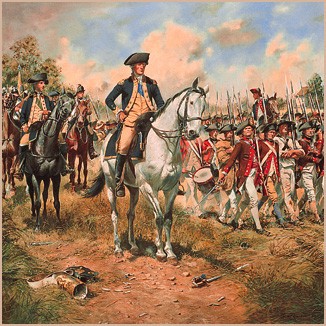
The signing of the Declaration of Independence presented the American revolutionaries with more than just political challenges. It also required the war with England to be pursued to a conclusion.
Finding themselves in such a war was a concerning situation for the American colonists. Not only was it to be waged against the ‘mother country’ but the Americans were drastically unprepared for any major conflict, let alone one against the world’s dominant military power. The Americans had no national army, only poorly trained and disorganised state militias. Their soldiers had muskets but virtually no artillery, and with England’s long-standing restrictions on colonial industry, there was almost no production of either weapons or munitions inside America.
On June 14th 1775, the Continental Congress adopted the New England militias assembling around Boston since the Battle of Lexington as its fledging Continental Army. On the following day, it appointed George Washington as commander-in-chief.
Having accepted the position, Washington travelled to Massachusetts to take on his duties. He found his new ‘army’ to be, for the most part, unworthy of the name. Military discipline was virtually non-existent while most soldiers did not have a weapon and many were just farmers and teenage boys. America’s first soldiers had little understanding of how an army functioned or the procedures and disciplines of military life.
Washington, both an elitist and an experienced military man, was not impressed. He stated in one letter that the men of the Continental Army were potentially capable soldiers but were essentially “nasty people”. In the following months he implemented measures to whip the fledging army into shape. Military discipline was rigidly enforced, to the point where there were several floggings daily.
Washington also took on several lesser duties that were usually performed by lower-ranking officers, such as organising drill or issuing daily orders; this hands-on leadership both earned the respect of the men and ensured some early cohesion in an army that didn’t seem as if it would last.
“A lack of planning and a chain of ad hoc reactions to military necessity were [the] most salient characteristics… of congressional war administration. The result was an unsystematic, ill-managed system that divided responsibility for maintaining the army among committees, state authorities, military commanders, officers and civilians. [This] stood in stark contrast to the more successfully organised supply and medical system of the British army.”
E. Wayne Carp, historian
The Americans did capture Fort Ticonderoga in northern New York, mainly to steal its cannon for use in attacks on British forces in Boston (the Americans suffered a dire shortage of artillery in the first years of the war). Washington’s army moved to New York but was defeated in battles at Long Island and Manhattan, and eventually driven out of that state by the armies of Howe and Cornwallis.
By December 1776 the Continental Army was encamped on the Pennsylvania border, across the Delaware River from a British-German garrison in Trenton, New Jersey. Washington’s situation was desperate: a string of defeats was drawing personal criticism from both the public and Congress, it seemed as though he would be replaced in the new year. To make matters worse, a sizeable number of his soldiers had signed one-year enlistments, and these were about to expire; Washington may soon be a general with a tiny army – or no army at all.
Copyright: The content on this page is © Alpha History 2019. It may not be republished without our express permission. For more information on usage, please refer to our Terms of Use.
